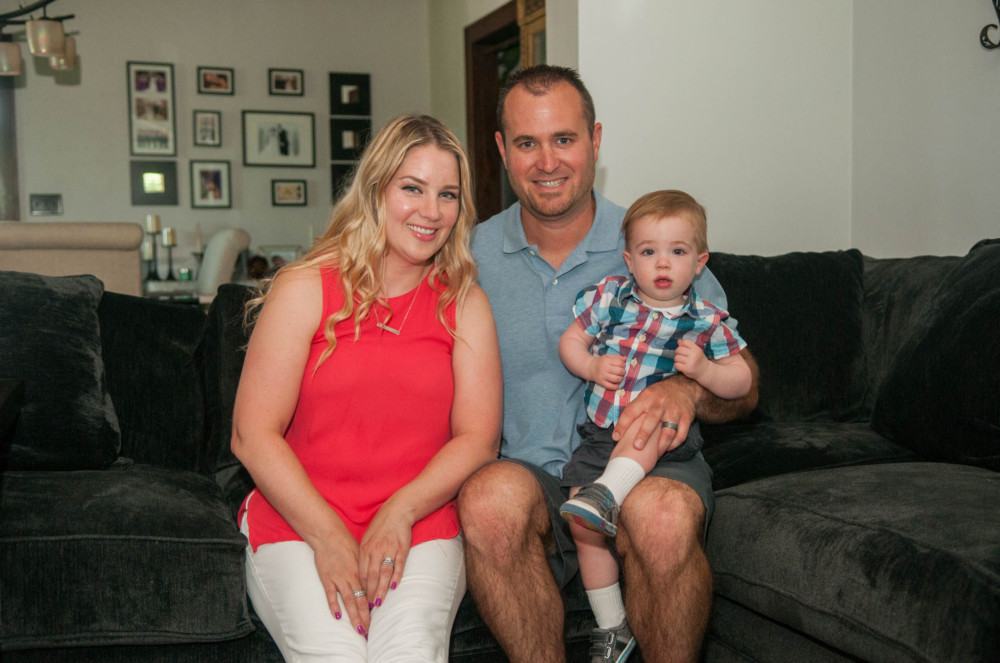By Matthew Gutierrez
Pittsburgh Post-Gazette
WWR Article Summary (tl;dr) Across much of the country, a parental leave crisis looms. According to the Bureau of Labor Statistics, only about 12 percent of private sector workers in the U.S. have access to paid family leave through their employers. This article show how parental leave changed the lives of one Pittsburgh family.
PITTSBURGH
When the Pittsburgh Paid Family Leave of Absence passed in spring 2015, Chuck O’Neill assumed the rule granting six weeks of paid leave for public sector employees applied only to mothers.
A few weeks later, he read an article about the policy and realized it included fathers as well.
“Holy heck, this is amazing,” he thought.
He soon figured paperwork was all that separated him from spending six weeks at his Summer Hill home with his son Mason, who was then a few months old.
O’Neill had just begun his job as fleet contract manager for the City of Pittsburgh. That’s why he chose to take his leave later in the summer, when he’d be settled into his job and his son could go on day care summer recess. On Aug. 1, 2015, O’Neill went on paid parental leave.
Across much of the country, a parental leave crisis looms. Only about 12 percent of private sector workers in the U.S. have access to paid family leave through their employers, according to the Bureau of Labor Statistics.
The 2014 National Study of Employers, a private study of large employers, found 58 percent reported providing some pay during maternity leave, but only 14 percent reported providing some paid paternity leave. A Department of Labor survey shows 9 out of 10 fathers take some time off work for their newborn, but 70 percent take 10 days or fewer.
In Pittsburgh, just nine of 3,377 city employees cited a new child as the reason for taking unpaid leave in 2013.
For many Americans, the costs associated with taking time off of work mean that paid leave, a rarity, is the only way they can afford to do it.
“Having a baby is one of the most financially significant times of your life and can result in serious financial hardship,” said Ashleigh Deemer, chief of staff for Pittsburgh Councilwoman Natalia Rudiak. Ms. Rudiak introduced the legislation giving city employees six weeks of fully paid leave. “For a lot of people, unpaid leave may not be an option.”
A growing number of corporations, many of them large, have implemented paid leave policies in the past year. Facebook has extended its leave program from four weeks to four months. Amazon is up to six weeks from zero. Twitter has doubled its leave time from 10 weeks to 20.
Yet while the concept of a more balanced work-family life is gaining recognition, the U.S. remains the only developed nation without a federal parental leave policy.
“We’re very, very behind the 8-Ball in terms of supporting both parents for paid leave nationally,” said Beth Brascugli De Lima, CEO of HRM Consulting, a San Francisco human resources consulting firm.
Had the Pittsburgh policy not been passed, O’Neill, 36, said he wouldn’t have gotten the six weeks with his son that, as he said, changed his life. During their time together, he took Mason, now 20 months old, to the park. They swam in the family pool in the backyard. Instead of waking up at 5:45 a.m. to spend nine hours a day at day care, Mason could sleep in, hang out in his pajamas and play with his dad.
The leave capped an emotional year and a half for O’Neill and his wife, Liz.
When Liz O’Neill was 24 weeks pregnant, doctors said Mason was at risk of being born early. She visited the doctor three days a week. Her stress levels rose to the point where her blood pressure was 170 over 110.
Cramps when she was six months pregnant began to hamper her ability to stand or walk. So she went on bed rest, only to find out later that those cramps were contractions. For the month leading up to Mason’s birth, she was in the hospital.
Mason was born Oct. 10, 2014, six weeks premature. After a month in the hospital, O’Neill had only two weeks of paid leave left. Mason had to go to day care at 8 weeks old, weighing just 4 1/2 pounds. He had a rare condition in which the neck muscles contract, causing the head to twist to one side.
“Every day I struggled with, ‘Why am I working?'” O’Neill said. “I wanted to stay at home but I couldn’t. So for Chuck to be able to do that was just awesome. Mason deserved that.”
“I thought about what it would have been like if I hadn’t had (the time off),” O’Neill said. “I can’t answer that, I don’t know. He and I know each other a lot better, exponentially more than we would have if I hadn’t had those six weeks.
“It made me realize just how important it is to be there for him on a day-to-day basis. It made me realize he’s the No. 1 priority in my life. If something seems like it’s not going well at work, or my team didn’t win a game, it makes all that seem much more meaningless.”
As for Mason, a year removed from a time when he was on neither the height nor weight percentile chart, he’s caught up physically with the rest of kids his age. At 20 months old, he’s right where he should be.














































































































































































































































































































































































